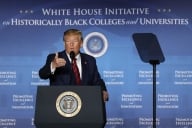You have /5 articles left.
Sign up for a free account or log in.
New Jersey's attorney general and the state's student loan agency have reached an agreement that ends an investigation into arrangements in which two lenders paid the state guarantor millions of dollars for loans that the agency helped direct the lenders’ way.
Attorney General Anne Milgrim and U.S. Sen. Edward M. Kennedy (D-Mass.) had announced last May that they were examining the legality of arrangements in which the New Jersey Higher Education Student Assistance Authority received about $2.2 million a year from Sallie Mae and the National Education Loan Network (Nelnet) as a cut of the volume of each loan referred to the lenders by the agency. That revelation came amid the steady stream of accusations against allegedly improper incentives given by student loan providers to colleges and financial aid officers, but represented the first allegation involving such an arrangement involving guarantors. The agency had ended the deal weeks before the revelation by Kennedy.
Under the accord announced Thursday by Milgrim's office, which largely affirmed changes in practice that the New Jersey had already adopted over the last year, the New Jersey agency agreed to use about $7.8 million it had received from the lenders to increase benefits for students. The voluntary agreement says that the agency, known as HESAA, can spend the money to lower student loan interest rates, pay default fees, or provide scholarships or loan forgiveness programs.
The voluntary agreement also imposes a state-approved independent "monitor" to oversee the guarantee agency's compliance with the agreement for a year. The term "monitor" has taken on a loaded meaning in the Garden State of late, given the imposition in 2005 of a federal monitor to oversee the financial and administrative operations of the scandal-ridden University of Medicine and Dentistry of New Jersey.
The monitor imposed on HESAA is designed to play a less intrusive role than the UMDNJ overseer, although Milgrim, the attorney general, said in an interview Friday that the independent official would be "closely watching the way that [agency officials] conduct business."
Officials at the guarantee agency, while agreeing to the arrangement as part of the voluntary agreement, have expressed concern that the existence of the monitor will diminish investor confidence in the agency. But Milgrim said she envisioned it having the opposite effect.
"It is important for HESAA going forward that the public have confidence that they have agreed to change their rules, and that somebody is making sure that that change is effectuated over the next year," Milgrim said. "It speaks volumes and should be a really positive sign to the public that they know that conflicts have been taken out of the [student loan] industry. It means this agreement has real teeth."
Officials of the New Jersey guarantor put out their own news release that put a different shading on the agreement signed with the attorney general. It notes that it had adopted the vast majority of changes agreed to in the settlement with the attorney general -- including ending its arrangements with the lenders and certain other marketing practices, adopting a Code of Conduct, hiring a chief compliance officer -- on its own during the last nine months.
“We are pleased, but not surprised, that our efforts to address the Attorney General’s concerns have been successful, resulting in this mutually agreeable resolution that allows us to continue to focus entirely on serving New Jersey students and families,” E. Michael Angulo, the agency's executive director, said in a prepared statement.
Milgrim's office also announced Thursday that 41 colleges in the state had voluntarily agreed to sign the code of conduct that she distributed to all New Jersey public and private institutions last fall. She said another four are in negotiations to endorse the code, which bars lender payments to financial aid offices, staffing of financial aid offices by loan providers, and "opportunity loans" from lenders to students who would not otherwise qualify for student loans.
The attorney general said that 11 other colleges in the state had adopted their own codes of conduct (which her office is reviewing to ensure that they largely mirror her proposed code), and that at least 9 institutions that had not adopted the code were still under investigation for possible improper financial aid practices. "Are there schools that we have concerns about? Yes."









